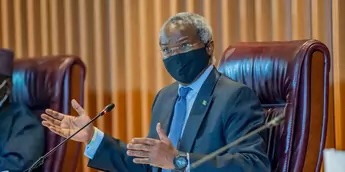The immediate past minister of works and housing, Mr Babatunde Raji Fashola, SAN, has said that the development of sports in Nigeria must not be left for sports administrators, but that it must involve the federal and state governments as well as all institutions of learning from primary schools to the university level.
Fashola stated this in his keynote address as a guest lecturer at the public presentation of the biography of a veteran sports journalist, Mr Mumuni Alao, who doubles as the Managing Director of Complete Communications Limited, on Sunday at the Tayo Aderinokun Hall, University of Lagos with the theme; “Re-Thinking The Current Football Business Model In Nigeria As A Catalyst For Sports Development.”
According to Fashola, “the development of sports in Nigeria does not depend entirely upon Sports Administrators only, but also involves the Federal and States’ Government; all institutions of learning from the Primary Schools to University Levels should also have free periods for organised sports in their curricular…
“The National Sports Commission should be in a position to assist States’ Sports Councils in the provision of sports facilities and organisation of competitions.
“In addition to increase in subvention to the Commission, the Federal Military Government would make the work of the Commission easier by given urgent attention to the following requests: The inclusion of the National Sports Commission in Decree No. 10 of 1971 so that Commercial Firms that make sizeable contributions to the Commission may benefit from some forms of tax relief; Removal of Import Duty on all items of sports kits and equipment ordered by the Commission; and the provision of training institute to allow the training of large numbers of Sports Organisers and Coaches.
Fashola, who also served as the Governor of Lagos State from 2007 to 2015, added that the standard of sports in Nigeria at present is very low, saying that this has not always been due to lack of funds, of facilities or of organisation, but also to lack of national consciousness, which he said every competitor must have in order to exhibit the dedication and determination which are essential for success in competitions.
He observed that mass participation in Sports – “as shown by research – enhances industrial production results in a virile and healthy nation, reduces child and adolescent delinquencies, enhances national prestige and is a potent weapon for promotion of unity in a country like ours.”
“Now that we have seen all of what has been done, what can be done, and still needs to be done, how do these general recommendations respond to Mumini Alao’s concerns about the ownership of football clubs by states and their sustainability, and how to get Nigerian spectatorship back into the stadia?
“The first thing to say is that modern arenas – with multi-purpose functions, will attract people, increased media coverage, safe parking, reliable transport services into and out of the venue, and the safety of the patrons and their families – will assure them.
“Simple raffle draws at half-time, using the ticket numbers to give token prizes like jerseys, useful devices like smartphones and souvenirs, but certainly no cash are options that can be considered as creative incentives.
“Governance, regulation, planning and calendarization are investment assurances and incentives for sponsorships.
“Most clubs around the world have supporters within the local communities and outside who own part of the clubs,” he said.
He noted that the time has come for those state-government-owned clubs to divest themselves of most or all of their shares and sell them to public under advice from those who have expertise in privatization not for self-serving purposes but to real business and sports minded concerns and supporters who will have a corporate governance and be subject to audits and company laws.
He said that in the effort to build ownership and by extension followership, support and ultimately brand identity, existing state-owned clubs must project a brand that people want to identify with and this varies across board from state to state.
“This identity will be discernible not from any superficial reasoning but from scientific investigation, both as poll/survey of what the people want or identify with.
“This will include—but will not be limited to—the name, colours, prevalent occupation in the area, that excludes ethnicity and religion. Township identities, occupational dominance and cultural practices are good branding considerations as the states seek to divest or new proprietors seek to inaugurate.
“Financial instruments such as insurance policies and bonds, and bank guarantees must be used to ensure that players’ and staff salaries are guaranteed before each season starts, and they can be enforceable in the event of default. This will require the Central Bank and other financial institutions to put on their thinking caps.
“Bankruptcy and liquidation proceedings already in our laws must be firmly applied to remove the cancer of failing clubs before they spread and contaminate others,” he said.
He emphasised that a minimum wage must be set for footballers applicable nationwide, while higher wages are weighted based on skill and performance.I have shared my headline thoughts about what I think needs – and must – be done to leverage the waiting opportunities in sports.
According to the former minister, as has been the case with many challenges the nation has confronted, “the solutions are within reach if we are prepared to do the hard work, enforce the rules and delay gratification.”
He advised that the country must not look for quick fixes, saying that he subscribes to the idea of a 10 Year Plan and a decade of commitment to sports development.
He said; “We must appoint sports administrators with proven knowledge and personal discipline who understand that our objective is not to win at all costs, but to win in the end by building something that lasts.
“The resources we require, in terms of manpower abound amongst our large number of persons below the age of 30 who have talent and energy.
“Teachers and coaches must be co-ordinated for talent scouting and development.
“Architects, builders and allied professionals must be co-ordinated to integrate existing transport infrastructure with sporting facilities and arenas; and develop new ones.Health workers of all cadres must seek the importance of sports to the human developmental index and collaborate to develop nutrition, care, support and deliver the best.
“Lawyers and arbitrators are required to be trained, to update and modernise the laws and regulations, and to ensure unflinching implementation.
“The media, communication and advertising professionals must re-position their approach for optimising the possibilities (training of personnel, investment in equipment, incentives for sponsorships).
“Government at federal level must focus on licencing dedicated sports outlets in print and electronic platforms to support the popularisation and publication of sports.In addition, this level of government must consider fiscal (and possibly monetary) policies that help to attract investment into sports on many fronts – particularly equipment manufacturing,” he said.


